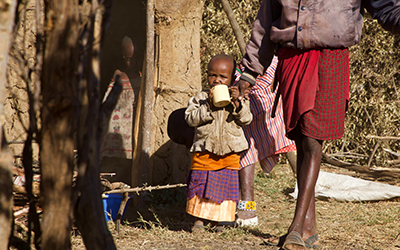Blog
Finding keys for development in Africa
Economics researcher Aimable Nsabimana shares the relevance and inspiration behind his recent work with UNU-WIDER on climate change and human development in Tanzania. How can research contribute to the wellbeing in Africa?
In 2019, I spent some months at UNU-WIDER in Helsinki as a Visiting Scholar, and this Working Paper was born as a result of that visit. At that time I was working on a study examining the impact of weather shocks on farming in sub-Saharan Africa. Interestingly, there was a call for research papers to contribute to a collaborative project between UONGOZI Institute and UNU-WIDER, with an aim to inform policy makers on how to advance sustainable development in Tanzania and East Africa.
After discussing with a UNU-WIDER research colleague, I decided to apply with my co-author Justice Mensah and our paper on the impact of weather shocks on child nutrition in Tanzania was accepted.
Twofold challenge
 We chose this specific topic for twofold reasons. First, child malnutrition remains a key challenge to Africa's development. The prevalence of undernourishment, especially among children, has risen in recent years and remains the highest compared to other regions. As a result, Africa lags behind on achieving the first two Sustainable Development Goals (SDGs) of ending poverty and hunger.
We chose this specific topic for twofold reasons. First, child malnutrition remains a key challenge to Africa's development. The prevalence of undernourishment, especially among children, has risen in recent years and remains the highest compared to other regions. As a result, Africa lags behind on achieving the first two Sustainable Development Goals (SDGs) of ending poverty and hunger.
The second reason was that weather shocks, such as drought or floods, have become more common in many parts of the world. The consequences of these unexpected phenomena are diverse, ranging from low agricultural productivity to natural disasters and low quality of health. The effects are particularly severe in developing countries due to reliance on subsistence agriculture for livelihoods and lack of income to invest in adaptation measures.
To find the connection between these two challenges we based the study on the Tanzanian national household panel data (2008-13) matched with geo-referenced data on local weather shocks.
Policymakers need to be more aware of the impact of weather shocks
We found that weather shocks affect the quality and quantity of child nutrition, and eventually induce stunting among children of less than five years old. Surprisingly, however, wet weather shocks such as floods do not affect child nutrition as much as drought. We also noticed that girls are not as affected as boys. The impact is cumulative, meaning that dry shocks may have long-term repercussions on child nutrition in the country.
The study shows that children are more severely affected in the regions which usually have an agreeable climate, where people are not so used to experiencing extreme weather conditions. Some regions in Tanzania already have climate adaptation practices in place, such as cultivating weather resistant crops or using alternative food types. But many regions need more support in facing the extreme weather conditions brought by climate change.
Many regions need more support in facing the extreme weather conditions brought by climate change.
This study contributes to the growing evidence that policymakers in Tanzania and beyond need for decision-making and for managing the impacts of weather shocks on human development. The impact on children means a direct impact on the future of the country. In Tanzania, where land areas are vast and agriculture is seen as a sector with great economic potential, new ways to adapt to climate change are one key to development. International NGOs, donors, and environmental agencies should also be aware of these results, because they have resources to support low-income countries in climate adaptation.
The research project is still under way and will need some additional inputs before we submit an article to a scientific journal. To complement the results, we aim to look into the existing health and demographic survey data to find out in more detail the nutritional situation of women and children in Tanzania. Tanzania has good survey data available, so we feel positive about finalizing these studies.
Building paths for a better future
Currently, I am a lecturer and researcher in the economics department of the University of Rwanda, and involved in several research projects examining the connections of nutrition, health and climate change with development.
One thing that originally pushed me towards doing research was a course during my master’s studies, Central Themes in Development Economics. During the course I realized that I could be one of the people to find solutions for challenges faced by developing countries. I have also been lucky to have several inspirational teachers and mentors along my academic path.
The research visit at UNU-WIDER helped me to improve my work and disseminate the research results. These kinds of opportunities are very important so that our young researchers can benefit directly from shared knowledge to build their capacities.
My professional dream is to work for research projects that improve public awareness about welfare in sub-Saharan Africa and contribute to better living conditions on the continent. The work on weather shocks in Tanzania is one step on this journey.
The views expressed in this piece are those of the author(s), and do not necessarily reflect the views of the Institute or the United Nations University, nor the programme/project donors.
 Join the network
Join the network





